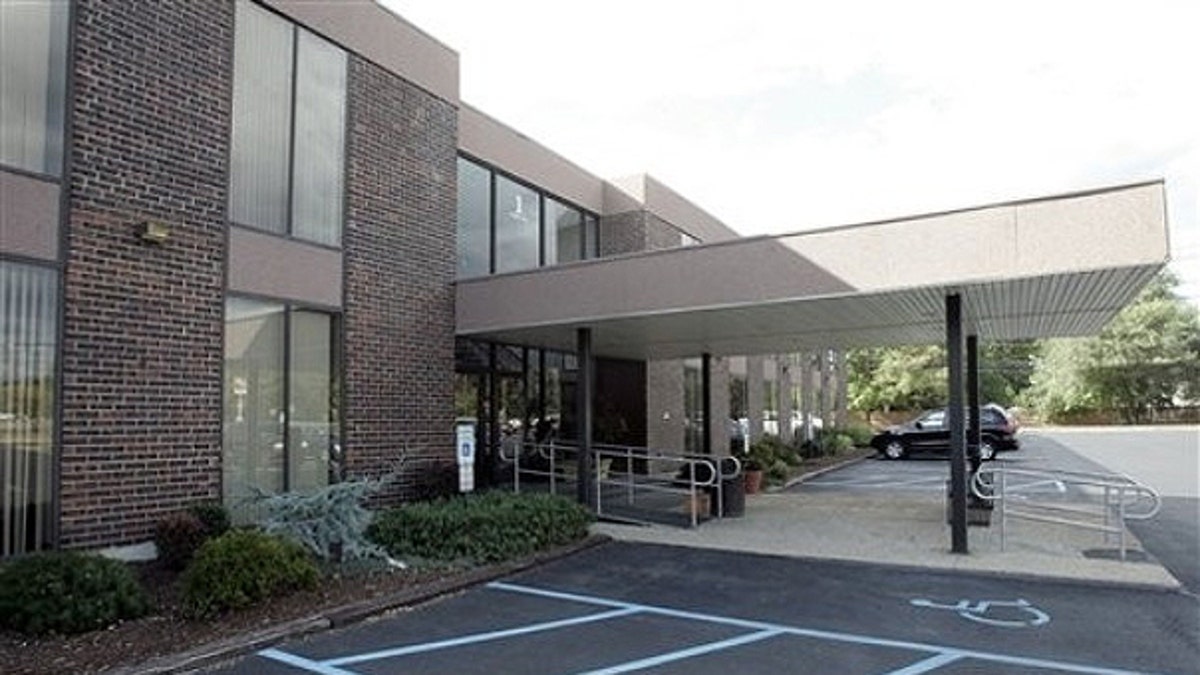
Sept. 9: The office of American Women's Services, owned by Dr. Steven Chase Brigham, is located in this building in Voorhees, N.J. Law enforcement and health officials in two states have accused Brigham of starting late-term abortions for patients in New Jersey, then leading them in a vehicle caravan to Maryland, where a colleague then completed the procedures. (AP)
TRENTON, N.J. -- A New Jersey doctor who ferried patients to his Maryland clinic for late-term abortions that he wasn't authorized to perform in New Jersey had his license suspended Wednesday by regulators who called his actions "manipulative" and "deceptive."
Dr. Steven Brigham started late-term abortions with medication in Voorhees, N.J., and finished them in Elkton, Md., where state law is more permissive, authorities said. He has no hospital privileges in New Jersey.
The New Jersey attorney general's office said Brigham was "grossly negligent" in transporting the patients.
Brigham plans to appeal the state Board of Medical Examiners' suspension of his only remaining medical license. He said during testimony that he believed everything he did was legal.
He told state regulators it was more "economical" for patients to have their late-term abortions performed at his office in Maryland rather than a hospital, as would have been required in New Jersey.
Brigham's attorney, Joseph M. Gorrell, has said the doctor violated no laws by transporting patients.
Brigham owns American Women's Services, which has offices in several states. He has had his license suspended or revoked in some states, dating to 1992, and was found to have botched two abortions in New York. Authorities in Maryland have ordered him to stop practicing medicine.
"Dr. Brigham plays fast and loose with the rules," Deputy Attorney General Jeri L. Warhaftig told the board, adding that if Brigham is allowed to keep his New Jersey license, "he will just go find another state" in which to perform abortions.
Much of the case centered the definition of when an abortion begins.
Warhaftig said Brigham started late-term abortions with medication in New Jersey, where he wasn't permitted to perform them, and finished them in Maryland, where the law is more permissive.
In New Jersey, Brigham gave women drugs that caused fetal death and softened the cervix, and also inserted a device to help dilate them.
His attorney argued that administering the drugs and dilator was preparation for the procedure, not the start of it. Gorrell said the board had already ruled on that distinction in 1994, when it defined abortion as "the evacuation of the fetus and placenta."
Warhaftig argued that the prior cases dealt only with the dilating device, not the drugs, and that addition of the drugs made travel more dangerous.
Brigham is not an obstetrician-gynecologist -- the state allows any doctor to perform first-term abortions -- and is not approved by the medical board in New Jersey to perform abortions of fetuses older than 14 weeks. Maryland doesn't have the same restrictions on fetal age, and the abortions he performed in Maryland involved women in their second and third trimesters, documents show.
Brigham was cited after a patient at a clinic he owned in Elkton was critically injured during the procedure. The patient was driven from the clinic to a nearby hospital, where she had emergency surgery to repair a ruptured uterus and small intestine.
In that case, Brigham gave the woman labor-inducing drugs and inserted a device to help dilate her cervix, but removal of the fetus was done by another doctor, documents show.
Many of the women who had the procedures done in Maryland said they were unaware of where they were going until they arrived at Brigham's office for the second part of their abortion procedure.
Brigham said he didn't give patients the address to avoid tipping off abortion protesters.
Gorrell tried unsuccessfully Wednesday to have the state's complaint dismissed, saying the medical board had already ruled on two cases against Brigham in the 1990s and found that the two-state procedure was legal.
The board, however, allowed the hearing to continue, saying that there were "substantial differences" in the cases.









































